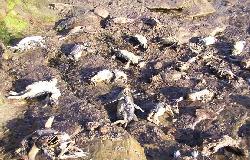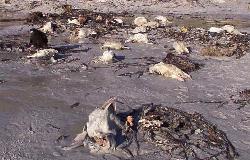| International press reports of our work to save penguins - CLICK LOGO to view article |
|
The Sunday IndependentPlight of Falklandsí starving penguinsSunday, 9th June 2002 - by Kirsty Turner
 Dr Mike Bingham, of Environmental Research Unit, who has been working with penguins in the Falklands since 1993, explained: "The penguins have died from starvation." Some of the beaches still have penguins so weak from starvation that they are unable to walk. Some farmers with penguins on their land have been trying to feed them, but there are so many, it is an impossible task. Although it is not possible to say that all the penguins have starved because of over-fishing, the fact that fishing boats take fish and squid which the penguins eat means it is much harder for penguins to find food. It was known last February that fish and squid were in short supply this year due to natural factors, but the fishing boats continued to take as much of the existing fish and squid as they could find. This left very little for the penguins, which have starved as a result. Dr Bingham said that even in years with good fish stocks, fishing too close to penguin breeding sites causes thousands of chicks to starve. He said "Many years ago, fishing vessels fished around penguin colonies in Chile, such as Magdalena Island where I conduct my studies. Penguins starved there as a result. But many years ago the Chilean government declared the island a nature reserve and set up a no-fishing zone around it. Since then penguin numbers have doubled." Magellanic penguins in Chile can find food for their chicks in 14 hours but in the Falklands they take over 34 hours. As a result, chicks in the Falklands get less than half the amount of food as their Chilean neighbours, so most of the chicks starve every year. In Chile an average of 1.4 chicks per nest survive, but in the Falklands the average is less than half, a dreadful 0.5 chicks per nest this year. The Environmental Research Unit, the Spheniscus Penguin Conservation Group, and the International Penguin Conservation Work Group have all called for a 30 mile no-fishing zone around penguin colonies worldwide, but so far the Falkland Islands Government has resisted this initiative. Dr Bingham said "Most penguins do not forage far from land when they have chicks, so if a no-fishing zone of 30 miles was established around penguin breeding sites, the conflict between commercial fishing and penguins for food would be greatly reduced. The Falkland Islands has a 200 mile fishing zone, so a 30 mile no-fishing zone would only decrease the available fishing grounds by three percent." |